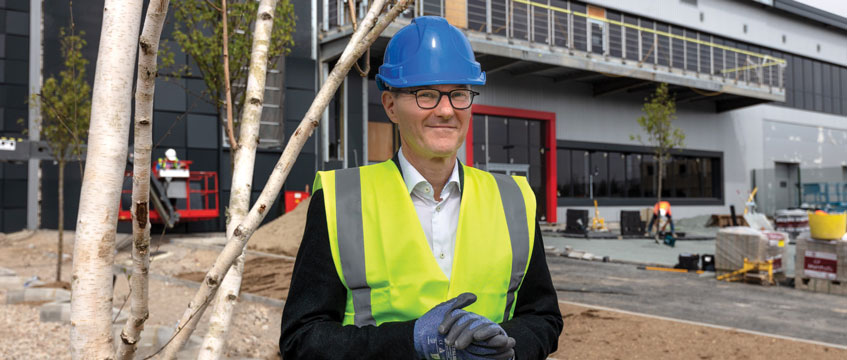With an OBE for services to business and charity in this year’s honours list, a flurry of stellar results to his name and a 10-year-plus tenure at the top of SEGRO, it would be easy for chief executive David Sleath to say “job done”. But those who know him know he’s never quite satisfied and is always striving for more. Samantha McClary meets him on site in north London to find out what keeps driving Sleath and SEGRO forward.
When it comes to being a good leader, stewarding a company from an almost inevitable takeover to being the UK’s largest listed REIT and delivering a whopping £4bn increase in portfolio value in the space of a year are quite good boxes to be able to tick. But for SEGRO chief executive David Sleath, leading the business and making it successful is about so much more than profit and loss. It’s about purpose and pride.
Sleath is now just over a decade into being chief executive, having assumed the role in 2011 after five-and-a-bit years serving as chief financial officer. In his early days at the helm, he had a portfolio that looked quite different to the one he presides over today – a portfolio that certainly didn’t perform anywhere near as well as the one SEGRO currently boasts. Those early years were all about fixing that portfolio. Today his focus is much more on purpose. On building a business that thrives. On building a business that survives at least another 100 years.
“When I first took on the role, it was a business that didn’t really have a very clear future,” says Sleath. “But we thought that industrial property, in its broadest sense, could have a bright future if it is in the right place with the right specifications.”
He adds: “The first part of the job was getting a clear sense of direction for both the portfolio strategy and the business strategy, and putting in place a structure to implement quite a lot of change. And in those early days, the first three or four years, it was pretty obvious what we needed to do because it was a crisis. We had to do something, otherwise – I think we were 93 then – we weren’t going to live to be a 100-year-old company because someone was going to come and take us out.”
SEGRO has, of course, lived to be 100 – albeit having had its big birthday bash postponed for two years owing to the global coronavirus pandemic – and that portfolio and business structure is now firmly in place.
The asset focus is on modern, generic, sustainable buildings in locations where it knows customers will come. And, with more than 1,600 customers (tenant is a banned word at SEGRO and has been since the days of the legendary Ian Coull) across a 103m sq ft portfolio of standing assets and a circa 15m sq ft development pipeline and those enviable financial results that keep landing, that structure is clearly working.
Enabling the extraordinary
It would be easy to sit down with Sleath and just talk about the growth of the business, about that £4bn increase in the value of SEGRO’s portfolio and the seemingly unstoppable attractiveness of the logistics sector. But, as he will admit, much of that stuff is outside of his control – the market will be the market.
“Although the valuation tends to be the headline-grabbing number, it’s not the most important metric for me because there’s not a lot we can do about it,” he says. “What does matter to me is how we’re driving the income from the portfolio, how we’re creating the platform for future growth, finding new opportunities to fill the hopper, and how we’re delivering on our responsibility agenda, which includes things like staff engagement, customer satisfaction, getting visibility on energy use by our customer base and so on. It’s all those things, and 2021 was an exceptional year for those things as well. It wasn’t just the headline-grabbing number, it was the broader business performance that made me particularly proud.”
For Sleath, having a clear purpose is vital to being able to deliver on those broader metrics. However, he is quick to admit that finding a purpose is harder than you think, and confesses that when first asked what SEGRO’s purpose was he got it completely wrong.
“I remember a conversation I had with an outfit called What If [now part of Accenture] and they asked us: ‘What’s your purpose?’ I thought: ‘Well, that’s a daft question. We’re here to make money for our shareholders,’” says Sleath. “Looking back, I can’t believe that this was only 2014/15 and I was so naive. They said: ‘That might be the purpose for some of your shareholders, but I’m pretty sure most of your staff don’t get out of bed to make money for your shareholders.’ It was actually the most insightful question.”
After a long time thinking hard about what it was SEGRO actually did, the firm landed on its purpose. It is a “business that creates the space that enables extraordinary things to happen”.
“We provide the physical space, but we also provide space for people to develop their careers and for the community to have some productive use,” explains Sleath. “And what’s more, what happens in that space is the everyday things that we all take for granted, whether it’s the stuff on your phone that’s coming through a data centre or food you’ve eaten or clothes you’re wearing. I’m pretty sure you’ve consumed, worn or used something that’s been through our warehouses – if not every week, then definitely every month.”
For him, recognising the firm’s purpose in enabling extraordinary things to happen is what has made the business the success it is today.
“That’s the most empowering thing we’ve come up with in my time as CEO,” he says. “One of the lessons for me around leadership is giving people a clear purpose. And that’s got to be more than just a narrow financial purpose. It’s got to talk to all of your important stakeholders.”
Taking responsibility
Born out of that purpose is a new focus on responsibility. In February 2021 the REIT launched Responsible SEGRO, a business handbook of sorts that set out some clear targets for the business around its impact on the environment, people and communities.
It is a set of ambitious goals – being net zero by 2030, creating and implementing community investment plans for every key market in its portfolio by 2025 and increasing the diversity of its own workforce – but goals that Sleath believes the business needs if it is to continue to prosper.
“We had a lot of work to do to get SEGRO on the right track and I’ll never claim the job is done, but I think we are in pretty good shape,” he says. “We’ve just delivered our best results by a mile, the business has tripled in size and we have the opportunity to double in size again in the next few years… but I’m pretty sure we won’t be able to do that just by doubling the amount of effort we put in or by doubling the amount of people we employ.
“Just doubling the size of the organisation to double the amount of business doesn’t feel like a recipe for success, so we’re thinking a lot about how we can do business differently. How can we innovate? How can we invest in technology? That is what enthuses me, and it’s all part of trying to make this amazing company even more successful in the future than it has been in the past.”
Among those ways of doing business differently is how SEGRO engages with its customers, particularly as it strives to meet its own net zero target. The company is working hard to gain an understanding of customers’ energy use, for example, and how it can help its occupiers on their own net zero journeys. Over the past 18 months, SEGRO has increased its customer energy data collection from 40% to 60%, but with a customer base made up of as many small companies as large and an extant distrust between landlord and tenant, it knows it has a long and hard road to travel to get to its 80% target, let alone 100%.
Changing the view of the logistics sector to one of diversity – SEGRO’s portfolio features data centres, production locations for streaming companies such as Netflix, medical distribution facilities and high-tech blood-cleansing laboratories, as well as the more traditional Amazon-style warehouses – of highly skilled workers and of adding to an environment rather than being a stain on it is part of the responsibility Sleath feels as steward of SEGRO.
Sleath sees warehouse logistics as “part of the vital infrastructure that enables our society to operate”.
“They enable us to get our hands on the goods and services that we take for granted,” he says. “People’s view of the logistics sector more generally is that it is low-value warehousing and driving jobs, and that’s not really true. It’s certainly not true of our portfolio, because some of the technologies and things that go on are much more diverse, making it a quite high-skill employer. It’s not just the enablement of those goods and services and that light infrastructure. It’s about giving really meaningful, interesting jobs to people who perhaps didn’t have them before we came along.”
Thoughtful growth
As the firm presses ahead with its goal to responsibly double the size of the business over the coming years, Sleath will be focused on finding “creative opportunities” for growth.
“We’re trying to be thoughtful about where we compete, where we have conviction around rents and then using our network of local people in all the markets in which we operate to try and source opportunities that might be a bit more complicated or have a bit more risk,” he says.
Assets that need repositioning feature highly on the REIT’s to-buy list. Assets like the 960,000 sq ft portfolio of offices in Slough, Berkshire, that it brought back into its ownership last December, five years after offloading them as part of a strategy to dispose of non-core assets.
“We never thought we’d ever want to own that real estate again because the economics just didn’t make sense,” says Sleath. “Now it makes massive sense because rents have grown significantly.”
He adds: “We’re looking at opportunities to redevelop and reposition in a way that we couldn’t have justified a few years ago. We will look for some greenfield sites, particularly for the logistics part of the portfolio, but the opportunity to take on older estates or non-industrial buildings is pretty exciting.”
Exciting enough to keep him stewarding SEGRO for another decade? Sleath struggles to say when he might be satisfied enough with what the company has achieved to move on and is well aware that “David is never satisfied for very long” is a phrase most of his colleagues would use to describe him.
“It’s part of the DNA that drives me,” he says. “I want the best for the business and the best for our people, and that makes me hungry for more.”
Responsible SEGRO in action
SEGRO Park Tottenham, where EG meets David Sleath to talk about the evolution of the business, is the REIT’s Responsible SEGRO programme in physical form. The industrial site, which was destroyed by fire and left a scar on the locality, has been developed with the local community in mind. Huge effort and cost have gone into making sure that the new 190,000 sq ft development fits in with its surroundings – so much so that SEGRO has even agreed to painting it “almost Prologis green”, jokes Sleath.
The scheme offers the most robust fire protection, with a large free-standing concrete firewall to protect nearby residents. It is carbon negative, with 127 new trees planted and 880m of hedgerows, and it is one of the only industrial developments with balconies. Each unit will have green walls, while the roofs will be filled with solar panels generating 10% more energy than the buildings need.
As part of SEGRO’s community engagement plans, the REIT has been working with the London Borough of Haringey to deliver a skills and training programme to help the local community secure employment. The programme includes apprentices working on the construction of the park and the delivery of STEM events for local school and college students.
To send feedback, e-mail samantha.mcclary@eg.co.uk or tweet @samanthamcclary or @EGPropertyNews











